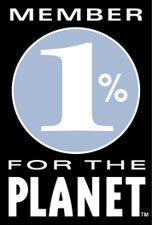Eco Fashion
Patagonia—Corporate Responsibility
www.patagonia.com
www.onepercentfortheplanet.org
In a world where large corporations can be dark destroyers, Patagonia shines as an example of the environmentally positive effect a big company can have. It is leading other corporations by example; continually greening itself while increasing profits.
The company’s fleece jackets and shells are made from recycled PET bottles and car dashboards. They minimize use of toxic chemicals in leather tanning for shoes. All of their cotton is organically produced, and they are pioneering another new material that combines recycled plastic with hemp fibers. (Keep your eyes open for the new hemp shoe soon to be released with Merrell.)

In addition to creating a reliable, healthy product line, Patagonia grants millions for wild lands protection programs, employees are offered a month paid holiday to volunteer with environmental groups and founder Yvon Chouinard has established 1% For The Planet which encourages companies to donate 1% of net profit (or 10% pre-tax profit) to environmental causes.
Shops are in Yokohama, Harajuku and all over Japan.
Eco Homes
Compact Fluorescent Light Bulbs
www.cflbulbs.com
They last longer, they save energy, and yes, they are well worth the extra cost. You see them every time you buy a light bulb and they are supposed to be good for the planet, but you don’t buy them because they are so darned pricy, right?
Well, the truth is Compact Fluorescents (CFL’s) provide more light with one-third the energy. And high quality ones last 8-10 times longer than regular incandescent bulbs. Do the math. They save you money!
According to CFL Bulbs Web site, “If every house in the U.S. replaced just one incandescent light bulb with an energy efficient CFL, it would eliminate the equivalent of the emissions from one million cars. And that’s only one bulb per house Most homes have 15-30 bulbs.”
So stop blaming the SUVs, and start buying CFL’s.
Eco Travel
www.ecotravel.com
If you are planning a trip, this one-stop Web site provides basic info and links to eco-friendly travel options all over the world. From volunteering opportunities at wildlife rehabilitation centers in Costa Rica to spiritual boutique safaris in Africa, low impact hotels in Patagonia and eco-friendly diving in the Maldives, this site has it all.
Whether you have something specific in mind or are just browsing, try their search engine and you will surprised at the amount of sustainable travel options out there. Now go have some good, guilt-free fun, and don’t forget to write.
Eco Lifestyle
LOHAS
www.lohas.com
www.lohasclub.org (Japanese)
www.lohas-world.com (Japanese)
www.rmi.org
LOHAS is the latest craze in marketing, and everyone seems to have a LOHAS something, from café’s to fashion mags. But what is it? LOHAS stands for Lifestyles of Health and Sustainability and encompasses goods and services that focus on health, the environment, social justice, personal development and sustainable living. So…what is it?
Simply put, if you buy LOHAS, you are a little more eco and socially responsible than the next guy. And if you see a company using the LOHAS tag, it means they are trying to be a little more green and sustainable.
My vote? It may or may not save the planet, but we might as well give it a try.
Eco Shopping
Just say no to plastic bags
There are 127 million people in Japan. Annually we throw away 30 billion plastic bags. That means each of us uses 627 bags a year. That means a lot of dioxins coming out of our incinerators and a lot of trash in Tokyo Bay.
There is an easy solution. In English, “No bag, please.” In Japanese, “Fukuro iranai.” Be polite but firm, and ignore the look of shock on the clerk’s face. Good Luck.





